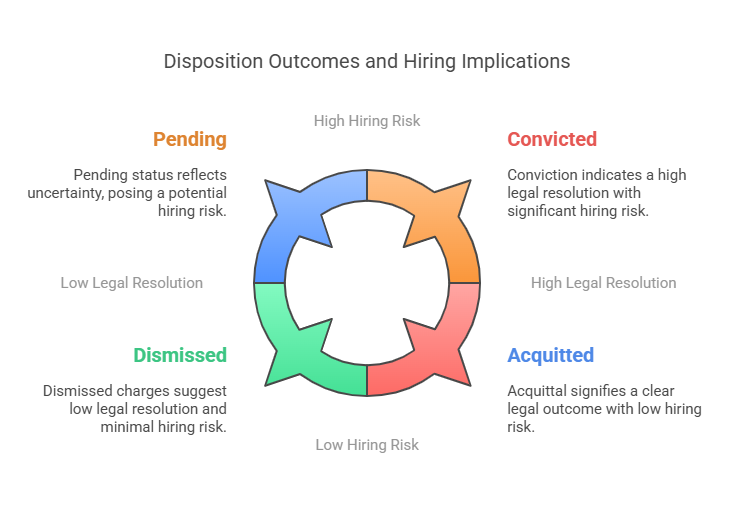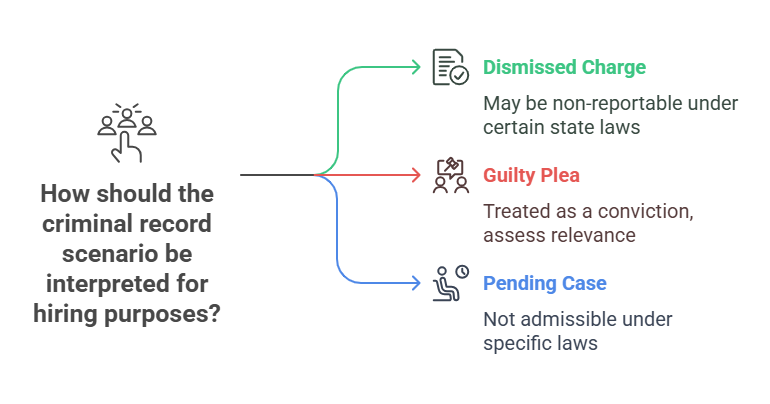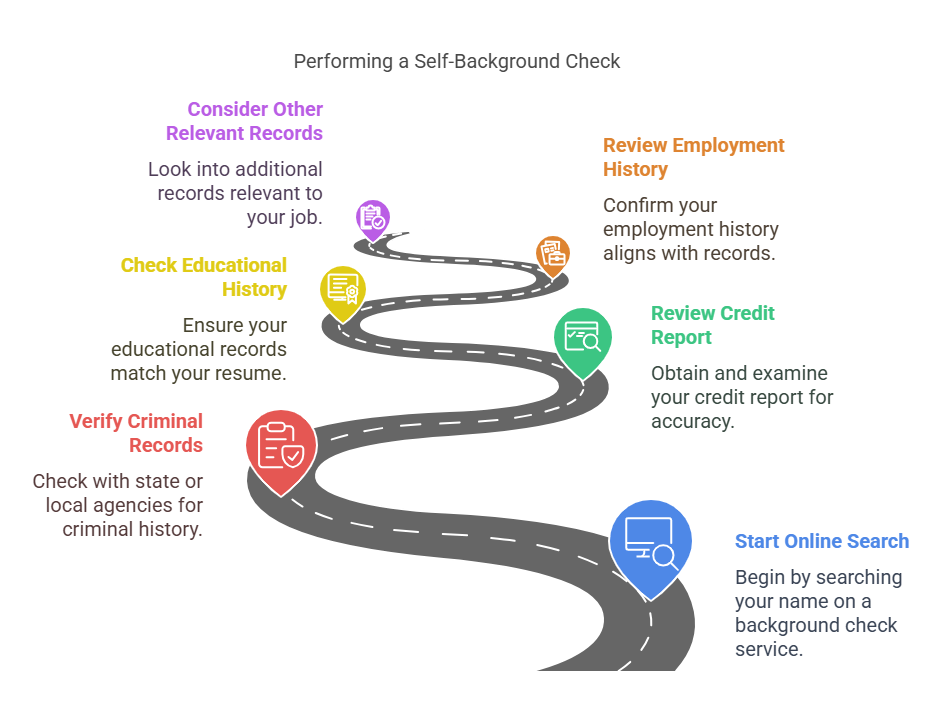When conducting a background check, understanding the terminology is crucial for making informed decisions. One term you might encounter is "disposition." But what does it mean, and why is it important? In this guide, we'll explore the significance of "disposition" on a background check and its implications for various industries, from healthcare to non-profit organizations.
Whether you are a business owner, HR professional, or job seeker, this guide offers valuable insights into background checks and how dispositions can influence hiring decisions. We'll also touch on related aspects like SSN trace background checks, whether DUI records appear on background checks, and more.
Key Takeaways
- Background checks play a vital role in hiring by providing employers with crucial information about applicants' histories.
- The term "disposition" on a background check refers to the outcome of a legal case and is essential for assessing candidate suitability.
- Different industries interpret dispositions uniquely, influencing hiring decisions based on sector-specific needs and standards.
- Complete background checks include verifying Social Security numbers, potential drug testing, and understanding criminal and driving histories.
- Performing a self-background check ensures accuracy and preparedness, helping individuals align their history with what employers may uncover.
Introduction
Background checks have become a staple in todayâÂÂs hiring processes, helping employers make informed decisions and ensure the safety and reliability of their workforce. Whether you're running a small business or managing HR for a multinational corporation, understanding the mechanics of a background check is essential. This guide zeros in on one pivotal elementâÂÂdispositionâÂÂand unpacks its relevance.
Why focus on disposition? Because those few lines in a background report can tip the scales in any hiring decision, clarifying the outcome of a criminal charge or civil matter. Whether you're an HR professional assessing potential hires or a job seeker navigating your history, a grasp of dispositions can shed light on what truly matters.
WeâÂÂve tailored this guide for a diverse audience spanning industries like healthcare, technology, and the non-profit sector. Our aim is to equip you with practical knowledge that will directly impact how you interpret background check results. Together, weâÂÂll demystify how dispositions work and why theyâÂÂre non-negotiable in todayâÂÂs hiring landscape.

"The best way to predict the future is to create it." â Peter Drucker.
I advocate cultivating a fair and honest culture within an organization. I believe that in attaining the company's goal, we have to start with a culture that is beneficial to all the people as the assets of the company are the people. As an HR professional, IâÂÂve seen firsthand how background checks can shape hiring decisionsâÂÂfor better or worse. A past mistake or legal record shouldnâÂÂt automatically disqualify a great candidate; context matters. My advice? Use background checks as a tool for clarity, not exclusion. The goal is to build a team that reflects trust, integrity, and opportunity, ensuring the right people get the chance to thrive.
Understanding "Disposition" on a Background Check
When you delve into a background check, the term "disposition" frequently surfaces. But what does it really mean? In simple terms, a disposition refers to the final outcome or resolution of a criminal charge. This boils down to the legal status of a case at its conclusion, signaling whether a person was acquitted, convicted, had their charges dismissed, or even if a case remains pending.
Let's break down some common types of dispositions you're likely to encounter:
- Convicted: This indicates that the individual was found guilty of a charge, either through a court verdict or a guilty plea.
- Dismissed: When a case is dismissed, it means the charges have been dropped, and the case has been closed without conviction.
- Acquitted: An acquittal means the individual was found not guilty, clearing them of charges.
- Pending: If a case is still ongoing, its disposition is listed as pending, awaiting a final decision.
Understanding dispositions is crucial for anyone involved in hiring, especially in industries like technology, hospitality, or staffing agencies. Dispositions provide key insights into an applicant's past and guide hiring decisions, helping you assess risk and reliability. Knowing that a charge was dismissed can be as significant as knowing a candidate was convicted, as it informs both the potential influence and the fairness in evaluating a candidate's suitability for a role.
Grasping the concept of dispositions not only aids in compliance with legal standards but also fosters informed decisions that align with company values and industry-specific nuances.

Disposition vs. Sentencing: Understanding the Critical Difference for Background Checks
When reviewing criminal history reports, employers often confuse these two legal terms. Here's a breakdown of their key differences and why they matter in hiring decisions:
Core Definitions
| Term | Disposition | Sentencing |
|---|---|---|
| What It Means | Final outcome of a criminal charge | Punishment ordered after conviction |
| Stage in Process | Case conclusion (pre-trial or post-trial) | Post-conviction phase |
| Examples | Dismissed, pled guilty, acquitted | 6 months jail, $1,000 fine, probation |
Key Differences Table
| Factor | Disposition | Sentencing | Why Employers Care |
|---|---|---|---|
| Timing | Case resolution date | Post-conviction | Verify case is truly closed |
| Reporting Rules | Varies by state (e.g., NY limits to 7 years) | Always reportable if conviction exists | Compliance with FCRA ç605 |
| Impact on Hiring | Non-conviction dispositions may be protected in 36 states | Conviction-based sentences require individualized assessment | Avoid discrimination claims |
3 Common Scenarios Explained
- Dismissed Charge (Disposition) + No Sentence
Example:Â Charge dropped after completing diversion program
Hiring Implication:Â May be non-reportable in CA, IL, MA under "Ban the Box" laws - Guilty Plea (Disposition) + Suspended Sentence
Example:Â Defendant pleads guilty but receives probation instead of jail
Hiring Implication:Â Treated as conviction - assess nature/time/relevance per EEOC guidance - Pending Case (No Disposition) + Bail Conditions
Example:Â Arrest record shows active case with temporary release
Hiring Implication:Â Not admissible in background checks under NYC Fair Chance Act

The Role of Dispositions in Background Checks
When hiring, dispositions serve as a telling compass for employers. A candidate's disposition can sway decisions significantly, especially in sensitive sectors. Take "convicted," for instance: it's not merely a word but a crucial signal that, without further inquiry, might tab an applicant as a potential risk. In contrast, a "dismissed" case suggests resolving discrepancies favorably for the candidate, shedding a more lenient light on their history.
Yet it's not just about who's hired or not. The legal maze surrounding these checks demands astute navigation. Employers must tread carefully, guided by frameworks such as the EEOC's guide on background checks. Ignorance isn't bliss here; it's a compliance pitfall waiting to happen.
Different industries also read between the lines of dispositions uniquely. Healthcare, with its emphasis on trust, might see a "pending" status as a red flag, while the non-profit domain, focused on community trust, may interpret "acquitted" with optimism. Even in transportation, where safety is paramount, the narrative woven by a disposition can either foster confidence or raise cautionary eyebrows. Thus, understanding dispositions isn't just a checkbox but a critical strategy in the hiring toolkit.
Related Background Check Components
When it comes to background checks, it's not just about the disposition; there are several other components that play a crucial role in painting a complete picture. First up is the SSN Trace Background Check. This is essentially a starting point in the background check process. It verifies that the Social Security Number (SSN) provided by the candidate is valid and checks it against known addresses and names. This can help identify potential red flags, such as alias names or undisclosed addresses, complementing the knowledge of a person's legal disposition.
Moving on, one might wonder, "Do Background Checks Include Drug Tests?" Well, drug tests are often part of pre-employment screening but are typically separate from traditional criminal background checks. They assess a candidate's current substance use, whereas background checks look into past activities and behaviors. Employers in sensitive industries, like healthcare or transportation, often mandate these, aiming to ensure a safe and compliant workplace.
Another common question is, "Will a DUI Come Up on a Background Check?" Yes, it often does. DUI records can appear on both criminal and driving history checks. For certain roles, particularly those involving non-CDL driving, such as delivery services, a DUI record might be a disqualifier. Employers weigh these findings based on how relevant they are to the job at hand.
Finally, there's the matter of, "Will a Dismissed DUI Show on a Background Check?" Typically, a dismissed DUI may still appear if the record hasnâÂÂt been expunged. However, its impact will likely be viewed differently than a conviction. Transparency with potential employers about such nuances can be crucial, especially if the role requires strong moral and ethical standing.
Understanding these components in tandem with the disposition provides a more comprehensive grasp of an individual's background, aiding in well-informed hiring decisions.
Conducting Background Checks for Different Sectors
Background checks are not a one-size-fits-all operation. Each sector comes with its own set of challenges and needs that inform how these checks are conducted and interpreted. Here's a quick guide tailored for specific sectors:
Background Checks for Small Businesses
Small businesses face unique constraints when it comes to time and resources. Efficiently conducting background checks can seem daunting, but itâÂÂs not impossible. Prioritize essential checks that align with the role, focusing on disposition statuses that are directly relevant to job duties. Utilize online platforms that offer comprehensive yet straightforward reports to save time and effort. Always ensure compliance with local regulations and inform candidates about the process to maintain transparency.
Non-Profit Background Checks
Non-profits often work with vulnerable populations, making thorough background checks a critical part of their risk management strategy. Dispositions like "convicted" or "pending" carry significant weight and should be assessed carefully. Volunteers and employees may undergo different levels of scrutiny, but the end goal remains the same: protect those you serve. Tailor your approach to reflect your organization's values while adhering to regulatory guidelines.
Tenant Screening
Landlords and property managers must have a keen eye for dispositions when screening tenants. A "dismissed" or "acquitted" status may not hold as much concern as a "convicted" case, but each should be evaluated in the context of financial reliability and character. Balancing fairness and due diligence is key. Use background check services that specialize in tenant screenings to streamline the process and assure compliance with housing laws.
Retail and Hospitality Sectors
High turnover rates in retail and hospitality call for a quick yet thorough evaluation process. Dispositions such as "pending" or "dismissed" may require context but should not be immediate deal-breakers. Focus on identifying red flags that directly impact customer service and safety. These sectors often require creative strategies to ensure compliance without lengthy delays in hiring. Ensure you stay updated on industry-specific regulations to avoid potential pitfalls.
Each sector has its nuances, but understanding dispositions and incorporating them correctly can lead to more informed hiring decisions across the board.
How to Perform a Background Check on Yourself?
Ever wonder what's lurking in your own background check? Doing a self-background check is both simple and enlightening. It's about being prepared, knowing your history, and ensuring everything is accurate. Here's a quick guide to doing it yourself without any fuss.
First, consider starting with a basic search online. Input your name into a reputable background check service that offers individual searches. You might be surprised by what surfaces, from old addresses to personal records.
Next, verify your criminal records, if any. Contact state or local agencies to access any criminal history that might be relevant. Most states have online portals where you can request this information. It's better to know than be caught off guard.
Your credit report is another vital piece. It's pivotal not just for lenders but increasingly for employers too. Request a free copy annually from each of the major credit bureaus. Comb through it for errors, unpaid debts, or signs of identity theft.
Educational and employment history is also worth a review. Ensure your resume aligns with what employers might find. If discrepancies exist, they could raise red flags during hiring processes. Check with your past employers or educational institutions if needed.
Finally, consider any other records relevant to your field. For example, if driving is part of your job, a motor vehicle report could be crucial.
Being proactive about your background check is about control. It helps prevent unpleasant surprises in job applications or promotions, and it ensures your records accurately reflect your history.

Frequently Asked Questions
What does "disposition" mean on a background check?
"Disposition" refers to the final outcome of a criminal case, such as "Convicted," "Dismissed," "Pending," or "Acquitted."
What does it mean when a case is disposed?
When a case is disposed, it means the case has reached a final resolution in the court system, whether by conviction, dismissal, or another legal decision.
What is the definition of a disposed case?
A disposed case is one that has been closed with a final judgment or ruling, meaning no further legal proceedings are pending.
What does case disposition mean?
Case disposition refers to the legal resolution of a case, indicating how it was concluded, such as through conviction, dismissal, or settlement.
What happens at a disposition hearing?
A disposition hearing is a legal proceeding where the court determines the final outcome of a case, particularly in juvenile or criminal matters, which may include sentencing or case dismissal.
What does "disposed" mean in case status?
In case status, "disposed" means the case has been completed in court, and no further hearings or decisions are required.
What are the types of court dispositions?
Common types of dispositions include "Guilty," "Not Guilty," "Dismissed," "Nolle Prosequi" (no prosecution), "Deferred Adjudication," and "Acquitted."
Does a dismissed case show up on a background check?
Yes, dismissed cases may appear on a background check, but many states prohibit employers from considering them in hiring decisions.
Can an employer deny a job based on a criminal disposition?
It depends on the employer and state laws. The Equal Employment Opportunity Commission (EEOC) advises that employers must consider the nature of the offense, job relevance, and time since the conviction.
How can someone dispute incorrect disposition information on a background check?
Candidates can file a dispute with the background check provider under the Fair Credit Reporting Act (FCRA) and provide supporting legal documents to correct inaccuracies.
Conclusion
Understanding the term "disposition" on a background check is more than just navigating legal jargon; it's about making informed, responsible decisions. Whether you're an employer evaluating a candidate or a job seeker preparing for an interview, knowledge of how dispositions work is essential. It helps organizations assess potential risks and aligns hiring practices with compliance standards, ultimately contributing to a fairer employment landscape.
We've covered the definitions, implications, and variations of dispositions, offering insights into how they affect hiring across multiple industries. From knowing that "dismissed" doesn't always mean erased, to recognizing the nuances of how a "pending" status might influence employer perceptions, these insights are crucial.
Final thoughts: Stay informed. The world of background checks is complex and ever-evolving. Adhering to local regulations and best practices ensures ethical hiring and reduces legal risks. Embrace this knowledge not only to leverage it in employment contexts but to uphold the integrity of your professional or organizational procedures.
Staying ahead means staying informed. Understanding dispositions is a fundamental step toward modern employment success, whether you're screening others or scrutinizing your own background.

GCheck Editorial Team
Meet the GCheck Editorial Team, your trusted source for insightful and up-to-date information in the world of employment background checks. Committed to delivering the latest trends, best practices, and industry insights, our team is dedicated to keeping you informed.
With a passion for ensuring accuracy, compliance, and efficiency in background screening, we are your go-to experts in the field. Stay tuned for our comprehensive articles, guides, and analysis, designed to empower businesses and individuals with the knowledge they need to make informed decisions.
At GCheck, we're here to guide you through the complexities of background checks, every step of the way.






